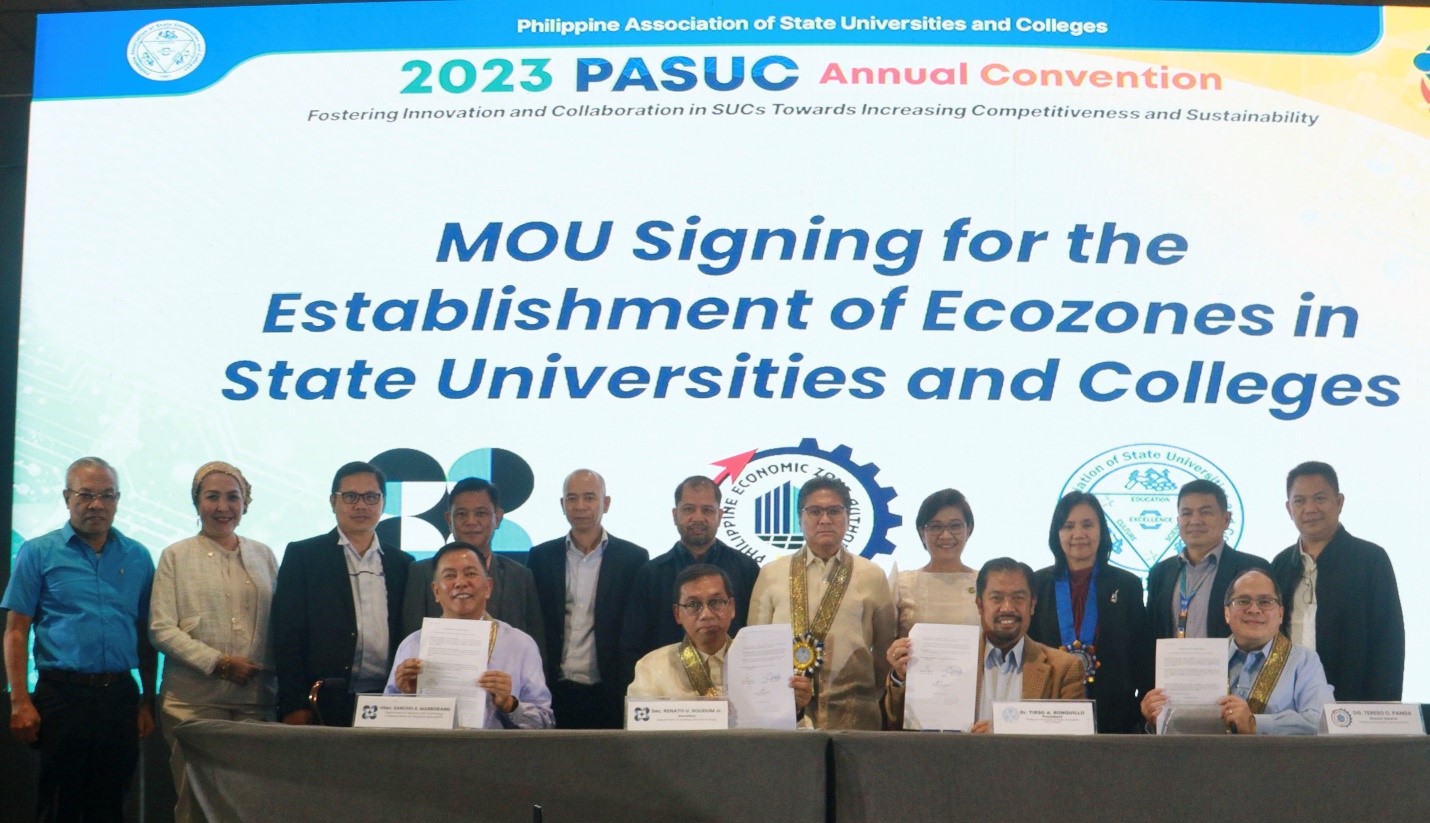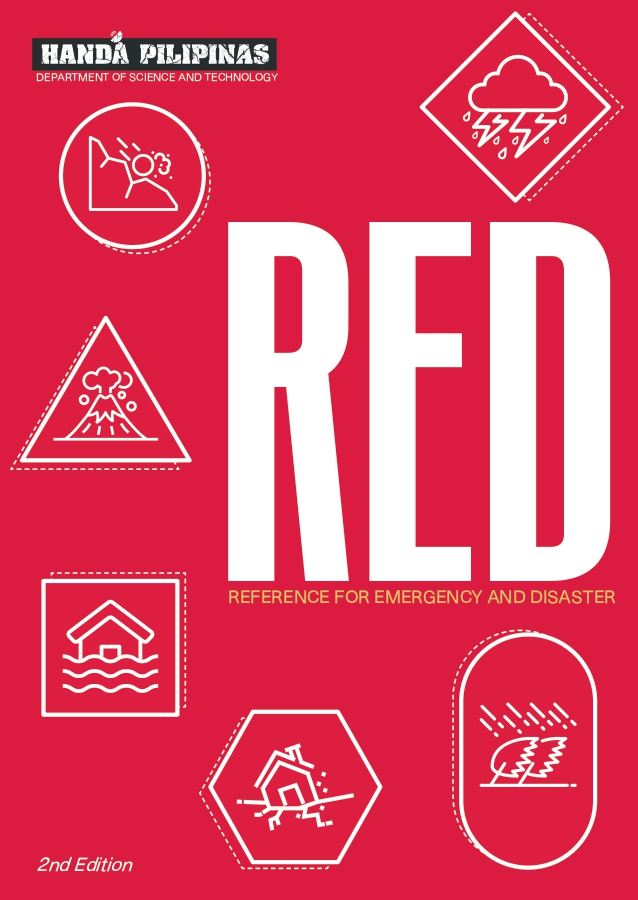 (From left, seated) Department of Science and Technology (DOST) Undersecretary for Regional Operations Engr. Sancho A. Mabborang, DOST Secretary Renato Solidum Jr., President of Philippine Association of State Universities and Colleges (PASUC) Dr. Tirso A. Ronquillo, and Philippine Economic Zone Authority (PEZA) Director General Tereso Panga during the signing ceremony with representatives from DOST, PASUC, and PEZA as witnesses.
(From left, seated) Department of Science and Technology (DOST) Undersecretary for Regional Operations Engr. Sancho A. Mabborang, DOST Secretary Renato Solidum Jr., President of Philippine Association of State Universities and Colleges (PASUC) Dr. Tirso A. Ronquillo, and Philippine Economic Zone Authority (PEZA) Director General Tereso Panga during the signing ceremony with representatives from DOST, PASUC, and PEZA as witnesses.
The Department of Science and Technology (DOST), together with the Philippine Economic Zone Authority (PEZA) and the Philippine Association of State Universities and Colleges (PASUC) signed a Memorandum of Understanding for the establishment of Knowledge, Innovation, Science and Technology (KIST) parks and ecozones in State Universities and Colleges (SUCs), during the 2023 PASUC Annual convention on 10 August 2023, at SMX Convention Center, Pasay City.
The KIST parks and ecozones intend to promote skills development, and knowledge sharing between the government, academe, and industry, for the commercialization of R&D, leading to the advancement of techno-entrepreneurship.
Secretary Solidum emphasized the increasingly important role of Science, Technology, and Innovation (STI) as part of the cornerstones for modern society, which forms the economic programs that can lead to a brighter and more sustainable future for our country. As such, he outlined the priority of DOST Directions for 2023-2028 strategic pillars that adhere to the promotion of: (1) Human well-being (Sa Siyensya at Teknolohiya, Kalusugan nyo ay Sisigla), (2) Wealth creation or generation (Sa Siyensya at Teknolohiya, Negosyo ay Tiyak na kikita, ang mga industriya ay aarangkada), (3) Wealth protection (Sa Siyensya at Teknolohiya, mga sakuna hindi alintana, kasi mas handa tayo at mas magiging panatag), and (4) Sustainability in which technologies will support the circular economy programs, environmental protection through further research and developments (R&D).
“Through [the] partnership with other government agencies, private organizations, and the academe. The DOST will continue to create solutions that are relevant and innovative and will fill in the gaps [in] all sectors and sectors and communities to achieve inclusive development,” he said.
The speech of Undersecretary for Regional Operations Sancho A. Mabborang underscores the presence of KIST Parks and Ecozones that will build a stronger partnership between the DOST, PEZA, and academe by increasing the growth of S&T-based firms, and the MOU will make it possible to further implement the program’s nationwide rollout.
As stated in the MOU, the DOST will provide technical assistance towards improving the Science-Technology-Innovation (STI) solutions that will lead to higher productivity and better quality of life, promotion of human well-being, wealth creation, wealth protection, and sustainability.
On the other hand, PEZA will promote the flow of investors, both foreign and local, into these economic zones by putting up these economic zones strategically in as many provinces as possible.
The PASUC, through its Platform for Innovating State Universities and Colleges (SUCs) for Industry 4.0 (PISI), aims to make the Academe an innovation driver under the KIST framework of PEZA.
During the press conference, Tereso O. Panga, PEZA Director General said “The KIST in academe can attract investors that are in R&D and innovation, with that engagement, [the PEZA] can now mobilize with MSMEs to be part of the value chain and commercialization of products that can create more jobs and livelihood.”
When asked what is the difference between a Techno Hub and KIST Park “The Techno Hub is an IT Park variant while the KIST [Park] is a result of the initial model of IT Park. The difference is that, in an IT Park, the activities are mostly IT enabled, these are your voice and non-voice, but in KIST we want it to be specifically hosted by universities, precisely because we want the investors to take advantage of the huge talent pool with the students, with the scientists, and the laboratories,” he stated.
When asked if there’s a priority specialization or field in KIST Park, the science chief said, “It will depend or vary on SUCs expertise, as we all know there were also technology and incubation business hubs in the same university sometimes that would cater to MSMEs.”
In the academe vein, President of PASUC Dr. Tirso A. Ronquillo said, “Academe has a bigger role in the value chain as it will do R&D. We see even that our KIST is only a high value and low volume development or manufacturing, it is not our mandate to mass produce. It is really on R&D and maybe we can have some prototyping on technology or product with higher value but we can produce in a low volume as a result of our research and after that, we can pass that on the side where they can do mass manufacturing.”
Accordingly, the SUCs will be benefitted from the KIST through access to fiscal and non-fiscal incentives offered by PEZA as a Special Economic Zone, Promotion of Industry as Academe Collaboration through technology transfer of University Intellectual Property, and acceleration of products and services of startups and spinoffs to the foreign market.
To date, there are already 44 SUCs that have signified their interest to have KIST Park. Batangas State University officially launched its KIST Park last July 20, 2020. On 03 August 2023, the DOST together with PEZA signed a Joint Memorandum Circular (JMC), forging the partnership for the establishment of KIST Ecozones in the country.
DOST Secretary Solidum hopes to involve the Local Government Units (LGU) as well to have a KIST Park; such as Cauayan City, Isabela that was established last March 2023 through the help of the Isabela State University. (By Mary Crystalline T. Araracap, DOST-STII)










